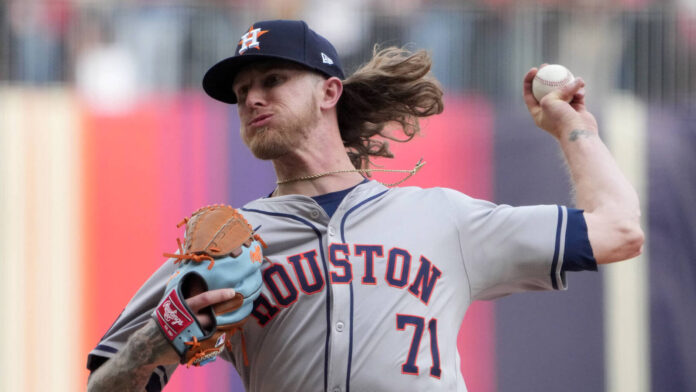The Houston Astros’ disastrous start may be the most surprising storyline of the MLB season.
Not only is the Astros’ historic streak of seven consecutive ALCS appearances at risk of ending, but Baseball Reference gives them just a 27.6% chance of making the postseason.
So, what exactly has caused Houston — 9-19 and last in the AL West — to struggle so much? The departure of former manager Dusty Baker has probably played a role, though several areas of the roster have contributed to their poor performance.
With that in mind, here are four factors responsible for Houston’s terrible start:
A decimated rotation
The starting rotation, which ranks 25th in ERA (4.90), is decimated by injuries. Cristian Javier, Lance McCullers Jr., Jose Urquidy and Luis Garcia are on the injured list. Several healthy pitchers, including Hunter Brown (9.68 ERA), Spencer Arrighetti (10.97 ERA) and J.P. France (7.46 ERA and now in Triple-A), haven’t filled the void, exacerbating the problem.
Justin Verlander and Framber Valdez, who each spent some time on the IL, are back in the rotation, and the initial returns are promising. Verlander has a 1.74 ERA through two starts, whereas Valdez allowed two runs and collected six strikeouts across five innings against the Rockies in his return to action Sunday.
Although the pair’s performances will be instrumental in spearheading a potential turnaround, Houston desperately needs its young arms to step up.
Bullpen hasn’t lived up to the hype
The Astros expected to have the most dominant bullpen trio in baseball when it signed LHP Josh Hader to a record-setting five-year, $95M deal this past offseason. However, the early returns are worse than anyone could have imagined. Over his first 12 appearances, the five-time All-Star has a 7.59 ERA with a blown save, though he’s not the only reason the Astros have the seventh-worst bullpen ERA among big-league teams (4.95).
Bryan Abreu (1.75 ERA in 2023) and Ryan Pressly (3.58 ERA in 2023) haven’t held up their end of the bargain, posting a 4.30 and 6.75 ERA, respectively. Additionally, neither of the two has recorded a save this season. Abreu blew his lone save opportunity and Pressly has two blown saves.
For Houston to get back on track, it needs Hader, Abreu and Pressly to return to form quickly.
Hitters aren’t coming through when it matters most
Despite their record, the Astros surprisingly have one of MLB’s better offenses, ranking third in batting average (.264), fifth in on-base percentage (.329), sixth in slugging percentage (.415) and seventh in OPS (.744). However, Houston hitters have struggled to capitalize when runners are in scoring position.
With runners in scoring position, the Astros rank 20th in OPS (.679) and RBI (77), 22nd in runs (82) and 28th in OPS+ (84; MLB average is 100). It’s worth noting that Houston’s batting average in balls in play in these situations is .309. Because the league-average BABIP is typically around .300, it’s fair to say that the team’s hitters aren’t just experiencing bad luck.
No home-field advantage?
Houston is 4-9 at Minute Maid Park this season, and while it’s a small sample size, if we look back to last season, the team’s lack of success at home appears to be a trend. Over their past 55 home games, including the playoffs, the Astros are 20-35.
You might think so, but no, it’s not just because there aren’t any video cameras in center field.
In fact, several Houston hitters told The Athletic’s Chandler Rome last season that they weren’t seeing the ball well in Minute Maid Park’s batter’s eye — the 40 x 80-foot green grassy area with the team’s logo landscaped into it beyond the outfield fence in center field. One player mentioned the batter’s eye was “not high enough” and had “too much stuff behind it.”
The team added green paint to the right side of the batter’s eye last September due to the complaints, but this could simply be a case of having a roster that’s poorly constructed for the ballpark.

